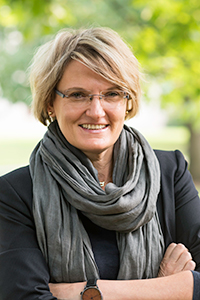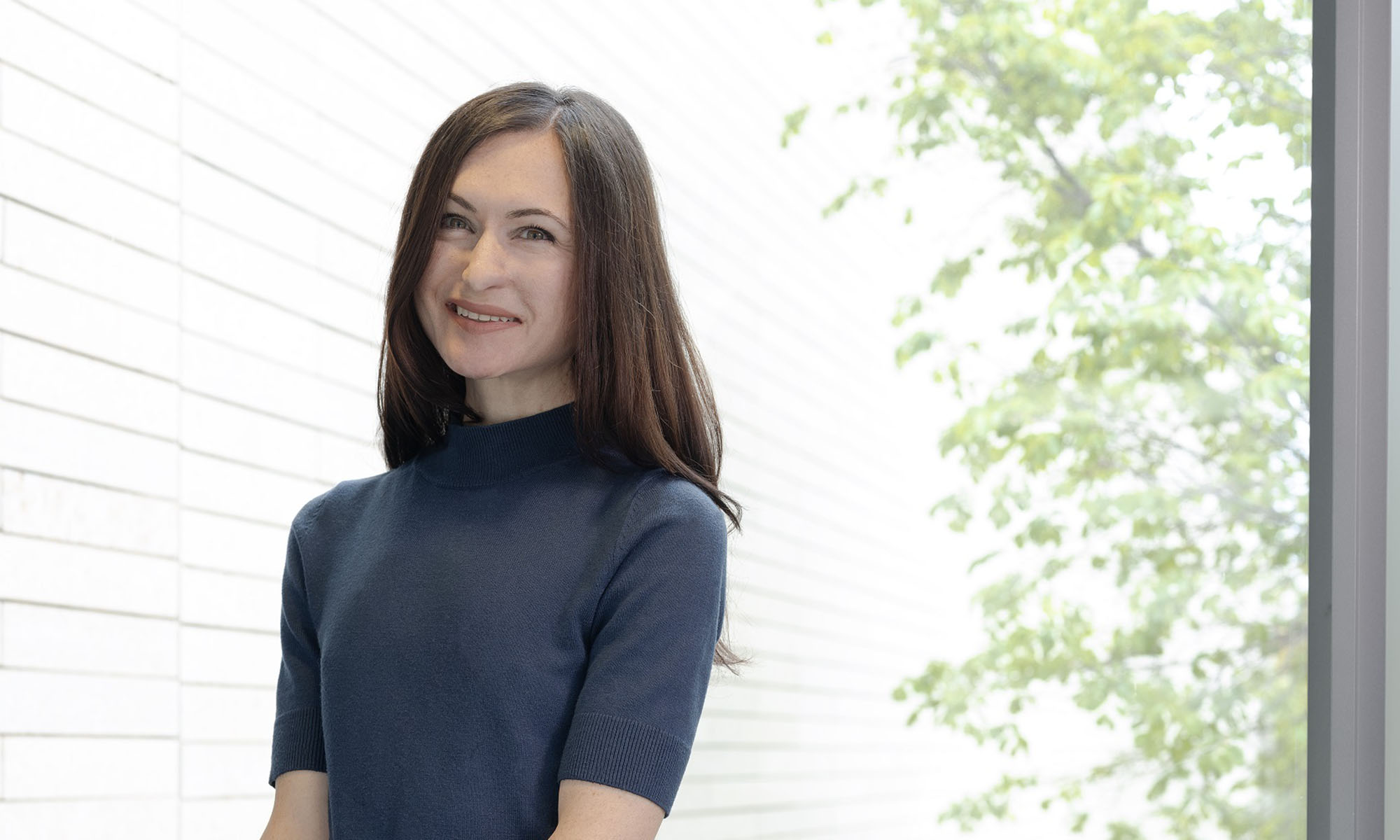
Tanya Bakhmetyeva ’06 (PhD) doesn’t view herself as merely a teacher. She’s part of a team, using a feminist pedagogical framework to create a classroom where students are equal contributors.
Each person shares and learns.
“Teaching can be boring if you’re not learning from it all the time,” says Bakhmetyeva, associate professor of instruction gender, sexuality, and women’s studies at the Susan B. Anthony Institute for Gender, Sexuality, and Women’s Studies and a recipient this year of a Goergen Award for Excellence in Undergraduate Teaching. “I want to be a participant in the knowledge production process. I want a classroom that’s truly liberatory, and part of that is empowering students. To do that, a teacher needs to be willing to give some power back to students.”
And to share personal moments from her own life, which began in Russia, then the dominant republic within the Soviet Union. Bakhmetyeva grew up in a small military village near Moscow. By the time she entered Moscow State University to study medieval Scandinavian history in the early 1990s, the Soviet Union had dissolved. “It was a very exciting but difficult time,” she says. “Changes were happening right before our eyes. I was a student of history, and we had no textbooks when I entered college. The old textbooks had become obsolete, and the new ones hadn’t been written.”
What students are saying
“There was never a dull moment in class. She captivates her students with her critical thinking skills, has an ability to listen to different opinions, and is always willing to learn from her students. Her unwavering support is one of the reasons I love the Susan B. Anthony Institute. She always made time for her students and is the epitome of what a professor should strive to be—an intelligent fearless leader with a heart of gold.”
—Sadyn Angeles ’19
“One of the things that stood out to me was the diligence and grace with which she handled hard topics being discussed in class. She made sure that information was shared, but all voices were heard with dignity and without fear. In one class, she took us on a hiking trip in the Adirondack Park. I had not been a hiker until then, but because of the way she presented the material and motivated me, I took the challenge. I have ever since become a hiker and closer to nature. She has been a great role model and someone whom I aspire to be both in academia and as a person.”
—Bruno Sacatucua ’19
“Gender studies is at once an academic subject and a personal journey. Tanya understood this and executed a delicate balance between professionalism and vulnerability, often would sharing her own experiences. Because of this approach, she cultivated a sense of trust with her students. She endlessly encouraged her students to explore their thoughts and push the boundaries of their learning. She listened intently to every voice, even from those who did not often speak up in class. She has made an insurmountable difference to her students and community.”
—Jacqueline Tran ’18
Bakhmetyeva says the collapse of the Soviet Union in 1991 spurred her deep interest in Catholicism. “It left an ideological vacuum in the lives of many people,” she says. “I was studying western monastic traditions in college at the time, so spiritual and academic interests converged. Becoming a Catholic was an odd thing to do, as Russia is mostly Orthodox.”
More than two decades later, in 2017, she published Mother of the Church: Sophia Svechina, the Salon, and the Politics of Catholicism in Nineteenth Century Russia and France. It received the 2018 Harry C. Koenig Book Prize for best Catholic biography. “The research was connected to my own experiences,” she says.
Bakhmetyeva graduated from Moscow State in 1996 and moved to the United States, beginning her doctoral program in modern European history at Rochester a year later. She earned her degree in 2006 and was hired as assistant director of what is now the Writing, Speaking, and Argument Program. In 2011, she joined the Anthony Institute, where she is the only fulltime faculty member.
In recent years, she has pursued community-engaged and experiential courses, working closely with the Center for Excellence in Teaching and Learning and the Rochester Center for Community Leadership. In the Politics of Nature, students explore environmental justice and unequal access to the outdoors, visiting local urban farms and hiking in Adirondack Park. “Students get a sense of empowerment when we spend six hours climbing Algonquin Peak (the second highest mountain in New York State at 5,114 feet) and then find ourselves on top of it,” she says.
She also developed and co-teaches Food Matters: Gender, Ethnicity, Religion, and Consumerism with Heather Layton, senior lecturer of art. In this course, students examine the significance of food from personal and global perspectives and cook food with community partners. As a final research project, the students collaborate on a cookbook illustrating their research, reflection, and invention.
“Gender studies is a field of study that comes from several different impulses—research, theory, and activism,” Bakhmetyeva says. “Community engagement for me was a tool at first, to bring this element of activism. But then it became a real personal commitment. Our University can make such a difference in the community, and the community can make such a difference at this University. And experiential learning is based on the belief that students learn best when they involve all kinds of senses.
Layton marvels at the many caps Bakhmetyeva wears in the classroom. “She is simultaneously a critical professor, an inspiring coach, and a member of their team,” Layton says.
Bakhmetyeva is also co-leading an ongoing research collaboration called the Climate Witness Project, which has taken several Rochester students to the Trans-Himalayan region of Ladakh, India, to study climate change in an area that has been devastated by catastrophic flooding, glacial recession, and endemic drought. Her partners are her husband, Stewart Weaver, a professor in Rochester’s history department, and anthropologist Nancy Perini Chin ’93 (MPH) ’98 (PhD), an associate professor of public health at the Medical Center.
Bakhmetyeva admits she was in “an utter state of panic” last March when the COVID-19 pandemic forced the University to go to all distance learning. “We were in the middle of a semester, and a sense of community and trust is so important in my classes because we constantly discuss very sensitive issues,” she says. “I spent so much time building that community in the classroom, and suddenly it was completely disrupted.”
She credits the University’s library and information technology staff with providing the tools and training to succeed in online teaching, but she also improvised to secure the trust she had built with her students. She met one-on-one with each via Zoom, asking how to make the reinvented class work best. “With in-person learning, you feed off each other’s energy and can easily get through a three-hour class,” she says. “Remote learning is more exhausting. It’s less energizing because the energy of the room isn’t there. It’s taught me to be a more caring, attentive, and flexible instructor.”
Bakhmetyeva is teaching both in-person and remotely this semester and, true to form, has stayed connected with students whenever possible. “When the weather is nice, I get a couple of folding chairs and take them outside,” she says. “We sit on the quad masked, the appropriate social distance, and we discuss classes in person. It’s so important to stay connected.”
Read about the other recipients of this year’s Goergen Award.


